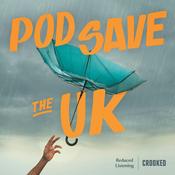3181 episodes
- Keir Starmer has headed to Germany for the Munich Security Conference to meet allies and discuss defence, NATO and the war in Ukraine. He is expected to meet Chancellor Merz and President Macron later, before delivering a speech in the morning. But – after his worst week as Prime Minister – can Starmer use this moment to reset his image as one of a statesman on the world stage, or could his problems follow him to Munich? Lisa Haseldine is attending the conference and joins Tim Shipman and James Heale to discuss.
Produced by Patrick Gibbons.
Become a Spectator subscriber today to access this podcast without adverts. Go to spectator.co.uk/adfree to find out more.
For more Spectator podcasts, go to spectator.co.uk/podcasts.
Contact us: [email protected]
Hosted on Acast. See acast.com/privacy for more information. - When a PM is in crisis, what do they do? Sack the head of the civil service. Having lost both his Chief of Staff and Director of Communications at the beginning of the week, Keir Starmer resolved to make it a hat-trick by dispensing with the services of his short-serving Cabinet Secretary. The favourite to replace him is Antonia Romeo – currently doing great work at the Home Office, but comes with a series of ‘caveats’ concerning historic allegations of bullying and irregularities over expenses when she was in New York. She has been cleared of these and passed the civil service vetting process (with caveats) – although Simon McDonald, the former Permanent Secretary at the Foreign Office, has popped up in the news to warn No. 10 about plans to replace Wormald with Antonia Romeo without a new appointment process.
All things considered, Romeo is ‘ballsy and brassy’ and currently part of the most successful Secretary of State/mandarin pairing in Westminster, alongside Shabana Mahmood. Could she be exactly what the civil service needs? Would she be the one to drive through some serious ‘change’?
James Heale speaks to Tom Shipman and Jill Rutter.
Produced by Oscar Edmondson.
Become a Spectator subscriber today to access this podcast without adverts. Go to spectator.co.uk/adfree to find out more.
For more Spectator podcasts, go to spectator.co.uk/podcasts.
Contact us: [email protected]
Hosted on Acast. See acast.com/privacy for more information. - PMQs today and – as predicted – Keir Starmer came out worst in a pretty unpleasant session. Kemi Badenoch pinned the Prime Minister on the continued Mandelson fallout and now the scandal over Matthew Doyle, the former No. 10 comms chief who – just four weeks after his ennoblement – Labour have already been forced to kick out of their party in the House of Lords, after it emerged he had campaigned for a friend charged with possessing indecent images of children. Once again, one of those mysterious appointments for which the Prime Minister is never responsible came back to haunt him in public – sound familiar?
The response from the Prime Minister was to get increasingly shirty, including with Sir Ed Davey, who accused the PM of a ‘catastrophic lack of judgment’ in his most punchy PMQs yet. Are we finally getting to understand the ‘real’ Keir Starmer?
James Heale speaks to Tim Shipman and Isabel Hardman.
Produced by Oscar Edmondson.
Become a Spectator subscriber today to access this podcast without adverts. Go to spectator.co.uk/adfree to find out more.
For more Spectator podcasts, go to spectator.co.uk/podcasts.
Contact us: [email protected]
Hosted on Acast. See acast.com/privacy for more information. - After a dramatic day in Westminster, the threat to Starmer appears to have receded – at least in the short term. But with the Gorton and Denton by-election less than three weeks away, (more) trouble could be on the horizon. Luke Tryl – from pollsters More in Common – and James Heale join Patrick Gibbons to discuss.
Produced by Patrick Gibbons.
Become a Spectator subscriber today to access this podcast without adverts. Go to spectator.co.uk/adfree to find out more.
For more Spectator podcasts, go to spectator.co.uk/podcasts.
Contact us: [email protected]
Hosted on Acast. See acast.com/privacy for more information. - Morgan McSweeney resigned yesterday as Keir Starmer’s chief of staff and – while it was not a surprise, given his role in appointing Peter Mandelson – the news that the Prime Minister has now lost his closest aide and political fire blanket is a huge shock. The repercussions are numerous: Starmer loses the man widely regarded to have won him his large majority and someone who was popular in No. 10; he has recruited two new deputies to fulfil a role considered insurmountable for one person; and it sets a precedent that anyone who allowed Mandelson to become US ambassador is liable for the chop.
For a Prime Minister without a political philosophy, McSweeney was the man with the plan – where does Labour go from here? Is this the end for Starmer – and who might replace him?
Tim Shipman and James Heale discuss.
Produced by Megan McElroy and Oscar Edmondson.
Become a Spectator subscriber today to access this podcast without adverts. Go to spectator.co.uk/adfree to find out more.
For more Spectator podcasts, go to spectator.co.uk/podcasts.
Contact us: [email protected]
Hosted on Acast. See acast.com/privacy for more information.
More News podcasts
Trending News podcasts
About Coffee House Shots
Daily political analysis from The Spectator's top team of writers, including Michael Gove, Tim Shipman, Isabel Hardman, James Heale and many others.
Hosted on Acast. See acast.com/privacy for more information.
Podcast websiteListen to Coffee House Shots, In The News and many other podcasts from around the world with the radio.net app

Get the free radio.net app
- Stations and podcasts to bookmark
- Stream via Wi-Fi or Bluetooth
- Supports Carplay & Android Auto
- Many other app features
Get the free radio.net app
- Stations and podcasts to bookmark
- Stream via Wi-Fi or Bluetooth
- Supports Carplay & Android Auto
- Many other app features


Coffee House Shots
Scan code,
download the app,
start listening.
download the app,
start listening.
































